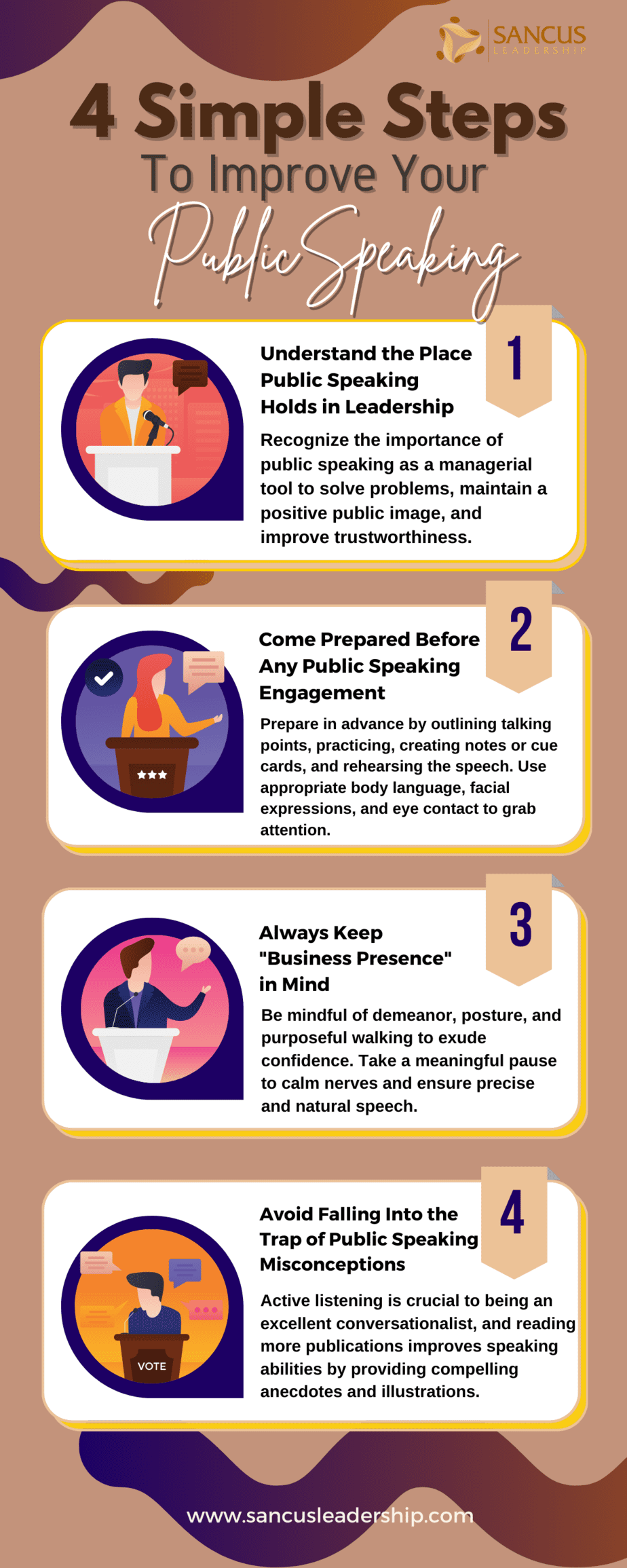The work of renowned philosopher Aristotle outlines the importance of rhetoric — how speeches appeal to emotion, character, and reason – ingredients necessary in any managerial act. Consider the budding entrepreneur, too; how a business journey and entry point in an industry starts with the power of a single product pitch.
Improving public speaking involves thoroughly understanding its importance in business, preparation, and a business presence. Today’s corporate strategies — including research and development and academia management — demand that leaders be well-versed in communication and presentation skills.
This article will detail steps to improve public speaking, including addressing misconceptions. I’ll also discuss practical tips for improving your public speaking skills.
How Can a Leader Improve Public Speaking?

As a leader shines in a role — from an individual standpoint into managing a team — one will encounter various situations and find oneself maneuvering from one client to another, from one goal to the next.
A leader can improve his public speaking skills by preparing for the speech in advance and scripting it based on their knowledge of its place in business. Great public speakers also use non-verbal cues like eye contact, hand gestures, and posture to communicate effectively.

Here are the steps to improve your public speaking.
1. Understand the Place Public Speaking Holds in Leadership
Look at the common factor among influential leaders and see how effective public speaking skills have become a crucial management act. Public speaking is, in many ways, a business component — it allows leaders to solve problems and maintain a positive public image.
The first step in effective public speaking is knowing its leadership role. Knowing its essential role in impacting others and improving trustworthiness will allow you to place the appropriate amount of effort into your speech.
A leader who values public speaking as a managerial tool will likely appreciate its importance.
A leader who values public speaking as a managerial tool will likely appreciate its importance.
2. Come Prepared Before Any Public Speaking Engagement
Especially for leaders managing small teams, preparing in advance is an excellent way to improve. Crucial in speech preparations is the ability to outline several talking points and practice these ideas several times.
Remember the six P’s; Proper Planning Prevents Piss Poor Performance.
Remember the six P´s; Proper Planning Prevents Piss Poor Performance,
Other leaders always come prepared with a meeting agenda, even sending it to their team before a meeting. Some also create note cards or presentation notes as a way of backup.
Some leaders also opt to practice with a peer to get their feedback. Use this time to ensure that all talking points are covered, including your voice’s inflections, while guaranteeing friendliness and sincerity in your tone.
Important to include in your preparations is the capacity to be comfortable with eye contact if you aren’t already.
Leaders should be able to look their team members straight in the eye to grab their attention and emphasize important points. Don’t talk to the crowd; speak to the individuals in the crowd!
Don’t talk to the crowd; talk to the individuals in the crowd!
Remember to employ appropriate body language and facial expressions. Leaders should be able to communicate significant points, including how a message should “stick.”
Preparing notes or cue cards in advance is a great way to rehearse your speech without appearing too scripted. It also allows for some improvisation, letting audience members participate or ask questions.
3. Always Keep “Business Presence” in Mind
Business professionals refer to a unique quality they call “professional presence” or business presence, believing that any manager with this quality has a competitive advantage above the rest. A huge part of this professional presence relates to how a leader speaks.
Research suggests building a great impression of expertise and reliability based on your verbal and nonverbal messages.
First, be mindful of your demeanor and posture when you enter a room and sit in front of an audience. Even walking to a podium must be done with purpose and confidence.
Experts also suggest having a meaningful pause to calm the nerves and look pleasant. This technique equips the speaker with confidence and allows for precise and natural speech.
Lastly, ensuring an effective business presence involves avoidance of distracting mannerisms. A way to prevent nervousness is to focus on your message, allowing you to ignore your anxiety.
4. Avoid Falling Into the Trap of Public Speaking Misconceptions
Effective public speakers know better than to believe misconceptions.
For one, most believe that speaking does not involve listening — but active listening is crucial to being an excellent conversationalist. Active listening involves listening to others for understanding rather than responding.
A related macro skill to speaking is reading. Some believe reading has no place in public speaking, but that is incorrect.
Any speaker will improve their speaking abilities with more publications read. These stories and experiences become compelling anecdotes and illustrations for future speaking engagements and business presentations.
Leaders should ensure that they find time to read. For example, look for stories you know will connect with your team or audience, something they can relate to.
Lastly, avoid assuming that effective speech is enough. All effective customer relationship programs capitalize not only on communication skills but also on building relationships.
What Are New Ways That Public Speakers Can Try?

Apart from the steps above, a relatively new way is embracing speech organization structures. The best speeches incorporate storytelling, so I recommend learning and implementing something called “The hero’s journey.” This will give you a framework to work from when building your speech.
The hero’s journey is a great way to engage your audience!
Another new trend is wearing the planned clothing for the scheduled presentation or meeting. Experts suggest that this helps the speaker be at ease and lessens self-consciousness.
In recent research, experts also encourage leaders to utilize video simulations. The advent of technology demands the familiarization of today’s leaders with advanced technologies as they grow into self-actualized leaders capable of delivering speeches regardless of topic, audience, and expected outcomes.
Another 2021 study suggests that focus group discussions (FGDs) can help leaders and their teams enhance their public speaking abilities. FGDs help leaders learn better organization and moderation of topics, including competencies such as impromptu questioning and meeting facilitation skills.
Here’s an insightful video of best-selling author, speaker, and organizational consultant Simon Sinek sharing his tips on how to improve your public speaking skills.
Conclusion
From the rise of polis-states in Greco-Roman times to the revolutionary corporate presentations of Steve Jobs, one could not deny speech’s power in leadership roles.
Managers of teams big and small must develop the habit of working on the art of conversation, getting constant feedback, and observing the styles of other influential speakers.



